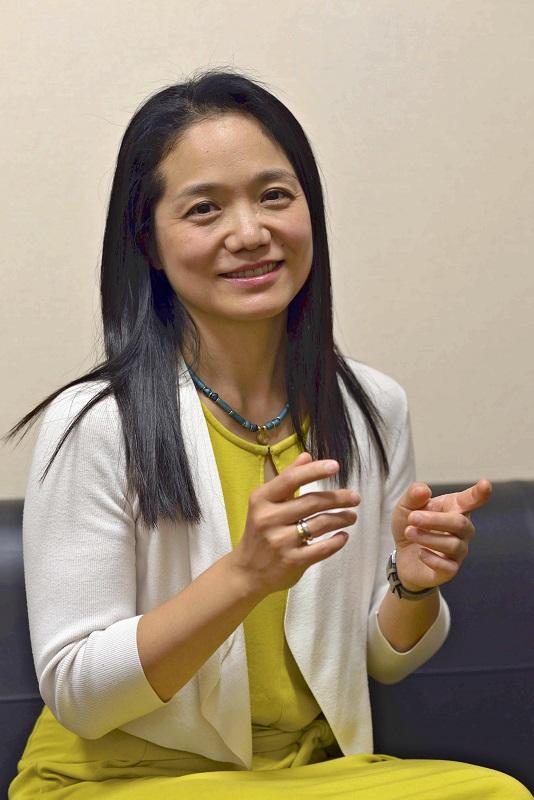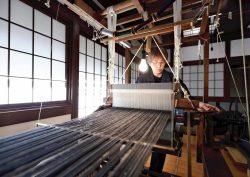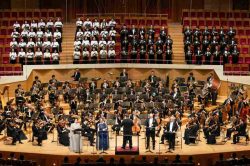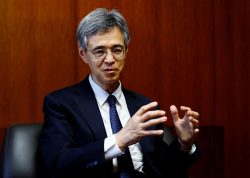
Hisako Kawamura speaks to The Yomiuri Shimbun. “Schubert’s music finds beauty that feels good in a familiar, everyday setting,” she said.
11:49 JST, August 18, 2022
Germany-based pianist Hisako Kawamura has so far performed two of Schubert’s last piano sonatas this year. Now the only sonatas from this period that remain are the final two, both published posthumously. What is she trying to convey in these performances?
Schubert’s sonatas pose difficult problems to pianists. Having no clear structure, unlike the sonatas of his contemporary Beethoven, they tend to sound as if they are happily singing and dancing without end. But Kawamura seems to have no problem with this.
“It’s like Schubert himself is enamored by the fundamental joy of music and absorbed in playing with sounds, which suits my temperament,” Kawamura said.
This year, she is performing four of Schubert’s last sonatas. She played two at her March recital, and will play two more at her September recital. At her March recital, she played Piano Sonata in G major, D 894 and Piano Sonata in C minor, D 958. These last sonatas have been somewhat deified, but she refused to perform them primly and instead played them with a carefree, almost improvisational feel and successfully depicted their cheerful aspects.
“They are bright, but there’s also a hint of resignation. His health was deteriorating, so he must have been feeling physically weak. Perhaps that’s the reason why he craved cheerfulness,” she said, thinking about the works.
At her September recital she will play Piano Sonata in A major, D 959 and Piano Sonata in B-flat major, D 960, which the composer completed several months before his death at the age of 31.
“[In those sonatas] he absorbs himself in the music to ease his physical pain and deliberately acts in good spirits. But his death was close at hand,” Kawamura said, looking as if she was feeling his immensely beautiful farewell from this world.
It is extremely difficult to convey such a mood. It can end up as boring music all of a sudden unless the player understands and expresses subtle changes in tempo, slight accents, the phrasing of the inner voice and the harmonies making transitions every second.
“In the past, I just spontaneously caught the detailed expressions with my intuition,” she said. “Now I read the scores thoroughly and think about the messages hidden in the background. I also want to face the music unaffectedly so that it won’t sound too serious.”
Kawamura is planning to use the recitals as a catalyst for her to delve further into Schubert’s music. She is considering making recordings some time in the future, but she is cautious, saying, “I’m still not up to the standard of making recordings right now.”
Her words underline her sincere and extremely delicate, sensitive approach to the composer.
The forthcoming recital will take place at Kioi Hall in Chiyoda Ward, Tokyo, on Sept. 13.
Top Articles in Culture
-

BTS to Hold Comeback Concert in Seoul on March 21; Popular Boy Band Releases New Album to Signal Return
-

Director Naomi Kawase’s New Film Explores Heart Transplants in Japan, Production Involved Real Patients, Families
-

Tokyo Exhibition Offers Inside Look at Impressionism; 70 of 100 Works on ‘Interiors’ by Monet, Others on Loan from Paris
-

Traditional Japanese Silk Hakama Tradition Preserved by Sole Weaver in Sendai
-

Exhibition Featuring Yoshiharu Tsuge’s Manga World Underway in Chofu, Tokyo; Unique, Surreal Works Draw Steady Crowds
JN ACCESS RANKING
-

Producer Behind Pop Group XG Arrested for Cocaine Possession
-

Japan PM Takaichi’s Cabinet Resigns en Masse
-

Man Infected with Measles Reportedly Dined at Restaurant in Tokyo Station
-

Israeli Ambassador to Japan Speaks about Japan’s Role in the Reconstruction of Gaza
-

Videos Plagiarized, Reposted with False Subtitles Claiming ‘Ryukyu Belongs to China’; Anti-China False Information Also Posted in Japan






















